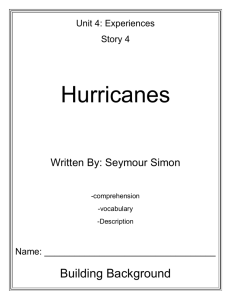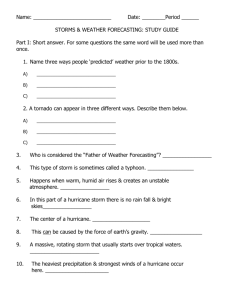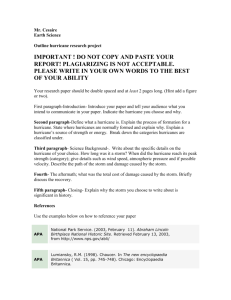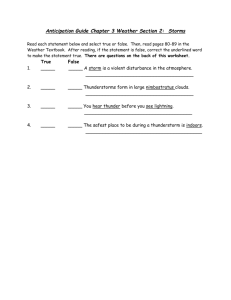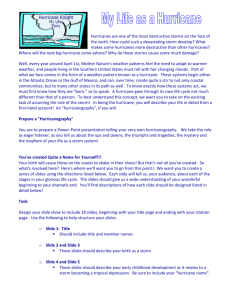Kristina & Jill: Hurricanes
advertisement
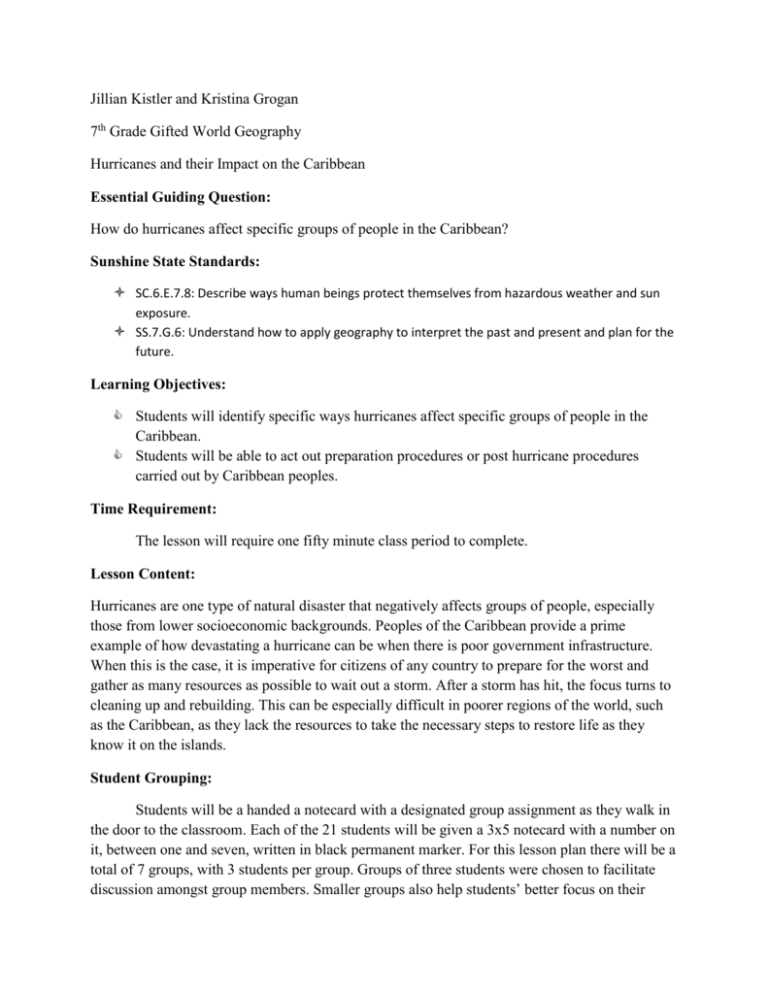
Jillian Kistler and Kristina Grogan 7th Grade Gifted World Geography Hurricanes and their Impact on the Caribbean Essential Guiding Question: How do hurricanes affect specific groups of people in the Caribbean? Sunshine State Standards: SC.6.E.7.8: Describe ways human beings protect themselves from hazardous weather and sun exposure. SS.7.G.6: Understand how to apply geography to interpret the past and present and plan for the future. Learning Objectives: Students will identify specific ways hurricanes affect specific groups of people in the Caribbean. Students will be able to act out preparation procedures or post hurricane procedures carried out by Caribbean peoples. Time Requirement: The lesson will require one fifty minute class period to complete. Lesson Content: Hurricanes are one type of natural disaster that negatively affects groups of people, especially those from lower socioeconomic backgrounds. Peoples of the Caribbean provide a prime example of how devastating a hurricane can be when there is poor government infrastructure. When this is the case, it is imperative for citizens of any country to prepare for the worst and gather as many resources as possible to wait out a storm. After a storm has hit, the focus turns to cleaning up and rebuilding. This can be especially difficult in poorer regions of the world, such as the Caribbean, as they lack the resources to take the necessary steps to restore life as they know it on the islands. Student Grouping: Students will be a handed a notecard with a designated group assignment as they walk in the door to the classroom. Each of the 21 students will be given a 3x5 notecard with a number on it, between one and seven, written in black permanent marker. For this lesson plan there will be a total of 7 groups, with 3 students per group. Groups of three students were chosen to facilitate discussion amongst group members. Smaller groups also help students’ better focus on their activity by eliminating the possibility of off-task behavior and distractions caused by having too many group members. Methods: Teacher based lecture: The teacher will lecture for a small portion of the beginning of class. Through this lecture the basic themes and fundamental details that have been studied during this unit can be recalled and reestablished for use in the main activity. Student Act-It-Out: The students will serve as the teacher during this portion of the lesson. They will use their own knowledge and the section reading designated for their group to teach the other students about the effects of extreme weather on people in low socio-economic countries. Activities: Opening Activity: As the students come into the classroom they will be handed a notecard. On the notecard there will be a number between one and seven. These numbers will indicate which group each student will be assigned to for the main activity. The teacher will lecture for the first five minutes of class. The economic factors as well as the social and governmental factors that are affected by hurricanes in low socio-economic countries will be addressed. The students will then be instructed to read a specific section in the designated chapter that corresponds to their card number. The students will then have five minutes to read their specific section. Main Activity: After completing the required reading for their groups the students will then have two minutes to transition into their small groups. During the planning time the students will have their Action Guide (see attached copy) to help guide their group’s final product. There will be seven different groups. Each group will be assigned a different role to act out. The groups will be as follows: o Acting out prevention and precautions prior to the hurricane’s arrival: Meteorologists Government officials Mother of six o Acting out the process of rebuilding after the hurricane’s arrival: Fisherman Tobacco plantation workers Doctors Reporters Each group will have a maximum of fifteen minutes to prepare a skit that acts out how each of these groups are affect by the incoming hurricane. The skits should be no longer than three minutes The students will have the final 25 minutes of class to present each of their skits. Each group is required to have all members participate in the planning and actions. During each performance the observing groups will fill in the answers on their action guide to the corresponding actors and their specific set of questions. This will be handed in upon exiting the classroom at the end of the presentations. The teacher in the last four minutes of class will explain the homework assignment. While explaining pass out the handout that the students will take home to guide them through their homework assignment (see attachment). The students will have to go home and speak with their parents and create an action plan in the case that their home or city were to be affected by a hurricane detailing procedures for before, during, and after the storm. This action plan will be handed in at the beginning of the next class. Important Questions to Ask: How does living in a poor Caribbean country affect a person of the upper class, middle class, and low income level during extreme weather such as a hurricane? What are the precautions that people of all income levels should plan to execute prior to a major hurricane hitting? What can people do to rebuild after a hurricane hits? Materials: Textbooks for reading and reference Notecards (for group Assignments) Action Guide Writing Utensils Evaluation: The students will be completing their Action Guides during the presentations and turning them in at the end of the class period. The Action Guides will be graded out of fifteen points. The completion of the Action Guide will provide a foundation for the students’ homework assignment. For homework the students will use what they have learned in class and return home to interview their parents. The students will ask what kind of precautions before and during a hurricane, as well as steps to rebuilding they take in case their home is hit. From this interview the students will create a hurricane action plan that they can use with their family in cases of emergencies. This action plan should be no more than one page long. It should include but is not limited to supplies the family will need and evacuation plans if possible. This assignment will be due upon the next class meeting. HOMEWORK GUIDE PERSONAL HURRICANE ACTION PLAN In the event of extreme weather you and your family will need to plan for different things. Interview your parents and ask them what they do to keep the family safe during hurricanes. On the back of this paper create an Action Plan for your family. Use the things that your family already does and make changes to things that are not helpful and add procedures that will maximize you and your home’s safety. Below are a few questions to help you get your interview started. Be creative and use the information in class to help you if you get stuck. Good Luck! - What supplies do you use during a hurricane? Where do you go during the hurricane? How do you protect your home? Are there things that could be done to prevent destruction that you do not do? How would you rebuild in case your home were damaged or destroyed? Would you fix your home or move to a new home? NAME ____________________ ACTION GROUP _____________________ Action Guide Use this Action Guide to help with the creation and action of your skit. Make sure that each question is answered from your group’s assigned section below in your skit. During the other group’s performances pay attention to the specific group’s questions. You will be required to fill in the blanks and turn in this Action Guide at the end of class. Meteorologist: How long have you tracked this storm? _______________________________________ What category hurricane is this storm? ________________________________________ What suggestions are giving to the people watching or listening to your broadcast to help survive the storm? ________________________________________________________ Government Officials: Did you put into place any temporary laws like a curfew for the residents of your country to help keep them safe? If so what did you do? __________________________________ ________________________________________________________________________ Do you have any relief units ready to assist the public after the storm (ex. Red Cross)? If so who and what will they do?_______________________________________________ ________________________________________________________________________ How does the government lose money because of a hurricane? _____________________ _______________________________________________________________________ In what ways that the government can profit from a hurricane? ________________________________________________________________________ Woman with six children: Does your family have a place to escape the storm? If so where? ___________________ What supplies will your family need to survive the storm? _________________________ What precautions have you taken to protect your home? __________________________ Fishermen: What kind of precautions did you take to avoid damage to your boat and supplies during the storm? ______________________________________________________________ How much damage did you prepare to fix and how long do you think it will take you to rebuild? ________________________________________________________________ What is one thing you could have planned better in order to make rebuilding your business easier? __________________________________________________________ Tobacco plantation workers: What damage was done to your work fields and how much time will it take to rebuild? _____________________________________________________________________ Will your employer be able to pay you for the time you are out of work because of the storm? ________________________________________________________________ What kind of work will you look for in order to supplement your income while you are out of work? ____________________________________________________________ Doctors: What kind of preparations did you take before the storm? ____________________________________________________________________ Did you set aside enough food, medical supplies, and staff to help with the aftermath of the storm? If not what could you have planned better for? _____________________ ____________________________________________________________________ What is the one thing that is highest demand after the storm? ___________________ Reporters: What places were affected by the storm the most?________________________________ Who is getting relief aid and who is not? (poor, rich, middle class) __________________ What kinds of relief efforts are underway to help the victims of the storm? ____________ _______________________________________________________________________
